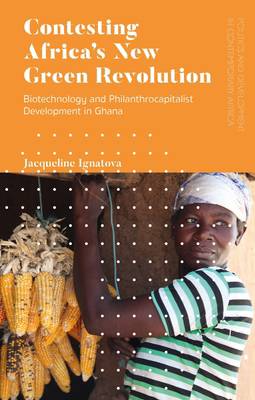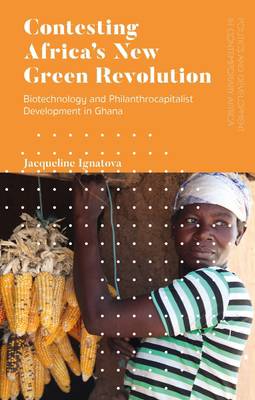
Je cadeautjes zeker op tijd in huis hebben voor de feestdagen? Kom langs in onze winkels en vind het perfecte geschenk!
- Afhalen na 1 uur in een winkel met voorraad
- Gratis thuislevering in België vanaf € 30
- Ruim aanbod met 7 miljoen producten
Je cadeautjes zeker op tijd in huis hebben voor de feestdagen? Kom langs in onze winkels en vind het perfecte geschenk!
- Afhalen na 1 uur in een winkel met voorraad
- Gratis thuislevering in België vanaf € 30
- Ruim aanbod met 7 miljoen producten
Zoeken
Contesting Africa's New Green Revolution
Biotechnology and Philanthrocapitalist Development in Ghana
Jacqueline A Ignatova
€ 67,95
+ 135 punten
Uitvoering
Omschrijving
Genetically modified crops have become a key element of development
strategies across the Global South, despite remaining deeply controversial. Proponents hail them as an example of 'pro-poor' innovation, while critics regard them as a threat to food sovereignty and the environment. The promotion
of biotechnology is an integral part of 'new Green Revolution for Africa' interventions and is also intimately linked to the rise of 'philanthrocapitalism, ' which advances business solutions to address the problem of poverty.
Through interviews with farmers, policymakers and agricultural scientists, Jacqueline Ignatova shows how efforts to transform the seed sector in northern Ghana - one of the key laboratories of this 'new Green Revolution' - may serve to exacerbate the inequality it was notionally intended to address. But she also argues that its effects in Ghana have been far more complex than either side of the debate has acknowledged, with local farmers proving adept at blending traditional and modern agricultural methods that subvert the interests of global agribusiness.
strategies across the Global South, despite remaining deeply controversial. Proponents hail them as an example of 'pro-poor' innovation, while critics regard them as a threat to food sovereignty and the environment. The promotion
of biotechnology is an integral part of 'new Green Revolution for Africa' interventions and is also intimately linked to the rise of 'philanthrocapitalism, ' which advances business solutions to address the problem of poverty.
Through interviews with farmers, policymakers and agricultural scientists, Jacqueline Ignatova shows how efforts to transform the seed sector in northern Ghana - one of the key laboratories of this 'new Green Revolution' - may serve to exacerbate the inequality it was notionally intended to address. But she also argues that its effects in Ghana have been far more complex than either side of the debate has acknowledged, with local farmers proving adept at blending traditional and modern agricultural methods that subvert the interests of global agribusiness.
Specificaties
Betrokkenen
- Auteur(s):
- Uitgeverij:
Inhoud
- Aantal bladzijden:
- 216
- Taal:
- Engels
- Reeks:
Eigenschappen
- Productcode (EAN):
- 9781786996565
- Verschijningsdatum:
- 29/12/2022
- Uitvoering:
- Paperback
- Formaat:
- Trade paperback (VS)
- Afmetingen:
- 156 mm x 234 mm
- Gewicht:
- 303 g

Alleen bij Standaard Boekhandel
+ 135 punten op je klantenkaart van Standaard Boekhandel
Beoordelingen
We publiceren alleen reviews die voldoen aan de voorwaarden voor reviews. Bekijk onze voorwaarden voor reviews.









